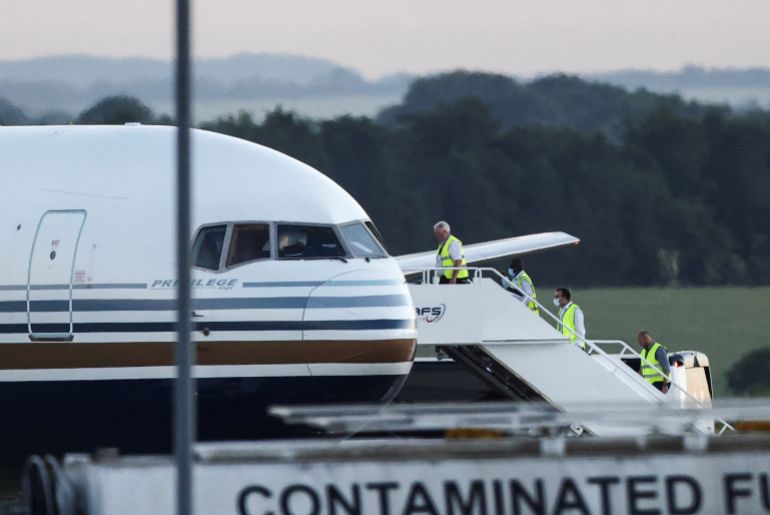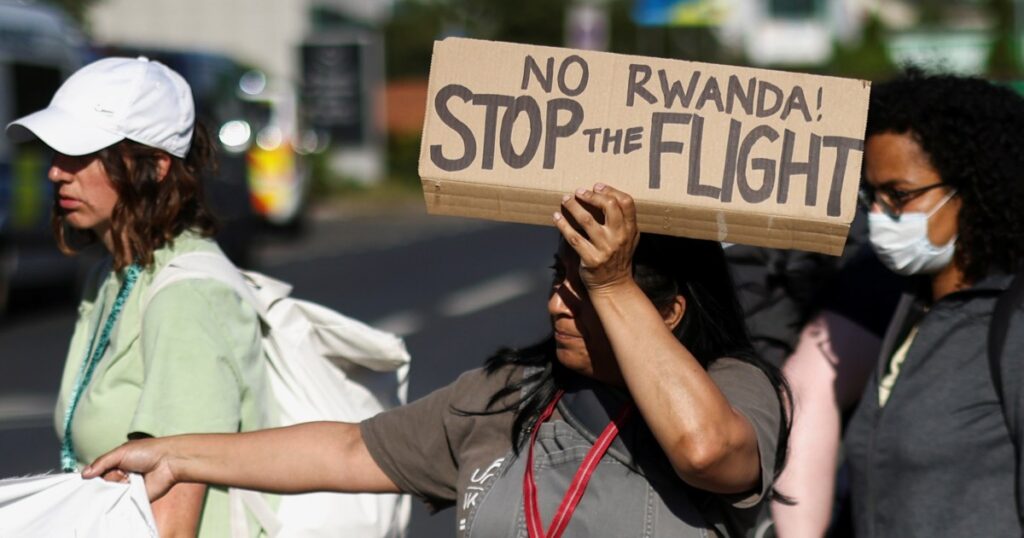After a plan by the United Kingdom to deport asylum seekers to Rwanda was scrapped last year, Kigali is now in discussions about a similar arrangement with the United States, despite concerns from rights groups.
This month, Rwandan Foreign Minister Olivier Nduhungirehe confirmed that his country is in talks with Washington over a migration deal, but concrete details have been scarce.
Analysts say this time, things just might work out for Rwanda.
Donald Trump’s government is actively deporting refugees to third countries like El Salvador and is reportedly in talks with Libya, a country beset by conflict and economic instability that already hosts tens of thousands of refugees.
US Secretary of State Marco Rubio has said that the administration is looking for countries, preferably distant ones, to accept deported individuals, particularly convicted criminals who have served their sentences.
“We are working with other countries to say, ‘We want to send you some of the most despicable human beings to your countries,’” Rubio said during a cabinet meeting in April, adding that far-off locations would prevent re-entry.
Human rights groups have, however, raised concerns that such deals could see refugees from unsafe countries being sent to other unsafe countries or even the very places they fled.
Here’s what we know about the proposed deal:
What is in the proposal?
Minister Nduhungirehe, speaking to state TV on May 5, refused to give the full details of Kigali’s discussions with Washington but said the two countries were involved in talks at the “early stage”.
“We are in bilateral talks,” the official said. It’s unclear how many refugees could be transferred or when that might commence.
Rwandan government spokesperson Yolanda Makolo, in a statement to Al Jazeera, said no details have been formalised.
“At this point, we are still in discussion and nothing has yet been agreed. One aspect of our approach is based on rehabilitation and integration, as opposed to prison camps or detention centres,” she said on Friday.
Earlier reporting by local Rwandan media suggested the agreement could see the US pay for a programme to help deported refugees integrate into Rwandan society through stipends and job assistance schemes.
The US has not publicly commented on the Rwandan talks.
In what looked like a possible model for future deportations, Washington quietly deported an Iraqi man, Omar Abdulsattar Ameen, to Kigali, the Rwandan capital, in April. Although Ameen was granted US refugee status in 2014 and is a resident of Sacramento, the US government under Joe Biden and the previous Trump administration had sought to remove him from the country.
In 2021, a court ruling said that Ameen could be deported because he lied about having ties with ISIL (ISIS), even though a cousin he associated with was a member of the armed group. Ameen’s lawyers appealed the decision, saying he faced execution in Iraq, where he is accused of killing a policeman.

Has Rwanda done similar deals in the past, and what happened?
In 2024, Rwanda attempted to seal a similar refugee relocation deal with the UK, but it ultimately failed.
The Migration and Economic Development Partnership (MEDP) deal was originally agreed to in 2022 when the UK faced a surge of migrants and refugees arriving on boats. The plan was for Rwanda to process asylum claims and resettle them in the East African nation if the applications were successful.
The agreement also stated that the UK was to provide aid funding to Rwanda and pay for the cost of processing and integrating each individual. Each person, in the first year, would cost £45,262 ($61,358). The plan was for an initial five-year period. Individuals not wanting to stay would be flown to their home country by Rwanda. The UK would pay £10,000 ($13,440) for every individual Rwanda returned.
However, legal challenges hampered progress as migrant advocates who condemned the move as unethical and unlawful launched several lawsuits. They argued the deal violates the non-refoulement principle of the United Nations Convention on Refugees, which protects people from being forced back to countries where they face serious threats to life or their freedom. At one point, a court order prevented a plane ready to fly the first set of people to Rwanda from taking off. Despite the opposition, parliament passed a bill of approval in April 2024.
However, after the new Labour government was elected last year, Prime Minister Keir Starmer called off the deal, calling it a “gimmick” by the previous Conservative government.
Separately, Rwanda has since 2019 partnered with the African Union and the UN refugee agency (UNHCR) to “temporarily” house migrants evacuated from detention centres in Libya, where they faced exploitation, torture and sexual abuse.
The UN says that of the more than 2,200 people evacuated to a UN-run facility in Rwanda’s eastern Gashora village, about 1,600 have been resettled in countries like Sweden, Norway, Canada, France and Belgium. All refugees relocated so far are from African countries. In return, the UN and the European Union provide funding to Rwanda as well as local infrastructure, such as building the village’s roads.
Why is Rwanda keen on a relocation deal? How much does it stand to gain?
Analysts say Rwanda is eager to secure a relocation deal for the money it stands to gain, but also to better its standing with Western countries.
Although highly praised for transforming from a war-torn nation where a genocide against Tutsis was committed in 1994, to a fast-developing economy, Rwanda is aid-reliant, with about $1bn in aid funding padding close to a fifth of the yearly budget. Most of that money comes from Germany, the US, and Japan.
A deal with a Western country would likely pump needed funds into the country. The UK deal, although now called off, saw Rwanda get paid about 290 million pounds ($389m) in pre-payments. If it had been successful, Kigali would have received about £150,000 ($202,000) for one individual over five years.
Makolo, the government spokesperson, did not speak to the financial details of the proposal. “African countries, including Rwanda, can be part of the solution to global challenges such as irregular migration, in a mutually beneficial bilateral relationship,” she told Al Jazeera.
Importantly, analysts say Rwanda is also likely seeking a better standing with its Western allies, many of whom have voiced displeasure over its military actions in the East African region, specifically in the ongoing crisis in neighbouring Democratic Republic of the Congo (DRC).
A UN Group of Experts, as well as the US, accuse Rwanda of backing M23, a rebel group that has seized major cities in eastern DRC in deadly offensives since January; Rwanda denies the accusations. M23, which is fighting the Congolese army and allied armed rebels, claims to be defending the rights of Congolese Tutsis, while Rwanda claims Kinshasa backs some former genocidaires now operating as militias in DRC.
Although the US government sanctioned Rwanda’s regional affairs minister, James Kabarebe, in February over Kigali’s support for M23, the Trump administration’s tone has noticeably softened in recent weeks, analysts say.
“This [deal] has something to do with that, of course,” Christian Rumu of Amnesty International told Al Jazeera. “Rwanda is in a very difficult situation, and by proposing this service, there is certainly a return that it will be expected. So this is political, and we can’t close our eyes to that.”
The US, which is seeking to seal a minerals deal with the resource-rich DRC, is now negotiating peace talks between the DRC and Rwanda. On April 25, Congolese Foreign Minister Therese Kayikwamba Wagner and Rwanda’s Nduhungirehe met with Rubio and signed an agreement committing to peace negotiations.
What do rights groups and the UN say about such deals?
The UN and rights groups like Amnesty International have raised fears about the safety and protection of refugees facing deportation to third countries.
In a statement last June when the UK-Rwanda deal was on the table, UNHCR said that while it has repeatedly commended Rwanda’s “generous” offer to host a facility for evacuees from Libya, it stands against shifting responsibility for asylum decisions to the country.
“UNHCR has been consistently clear on its concerns regarding the serious risks that ‘externalization’ poses to refugees, including refoulement, and finds that the UK-Rwanda Asylum partnership shifts responsibility for making asylum decisions and for protecting refugees,” the statement read.
Rumu of Amnesty echoed those observations, pointing out that the US deal would be different from the UNHCR-Libya case because a third-party organisation like the UN won’t be involved to properly verify that international asylum protection laws are being followed.
However, Rumu added, his opposition is also about the morality of such a deal.
“Rwanda has open visa policies, so if it was ever an option for these people, they would have gone there in the first place,” Rumu said. “This is about using people’s suffering. [The US] saying they’ll send the most despicable people shows it is rooted in bigotry and not in human dignity. This is about money and Rwanda positioning itself in the eastern DRC crisis – but it is people who will suffer for it.”
Analysts also question how Rwanda can safely accommodate people with criminal records, and if long-term integration with local communities is possible, in a country still grappling with its complex, post-genocide past.
Opposition politician Victoire Ingabire told Al Jazeera that it’s too early to say what effects the US deal might have on Rwanda, but that the country itself is dealing with multiple crises, including hundreds of people displaced since the 1994 genocide, and the new fighting in the DRC.
“Rwanda must first solve both internal and regional challenges so that it stops producing its own migrants,” she said. “This will prepare Rwanda to receive migrants from other countries in the future.”
How have Rwandans reacted to the UK and US talks?
The voices of Rwandans themselves have not been highlighted in these debates, whether in the failed UK deal or the proposed US partnership.
Rights groups, like Human Rights Watch, often criticise Rwanda for what they say is a repressive political environment that restricts freedom of the press and expression, and where people may be hesitant to share their views.
Last year, residents close to one Kigali hostel that was meant to host the refugees from the UK, spoke to Al Jazeera at the time the country’s parliament approved the plan, but they spoke anonymously and offered a neutral take.
Dativ, a 35-year-old, told Al Jazeera the UK plan sounded like a great idea because money would flow into Rwanda, and asylum seekers would bring more employees into the service sector. Rwanda’s economy mainly relies on services, tourism and agriculture.
Another Rwandan, a 45-year-old man who works as a taxi driver in the same neighbourhood and who refused to give his name, said it could go both ways: Rwandans could have more work, but the relocated asylum seekers could also be competing with locals for job opportunities.
Read the full article here

